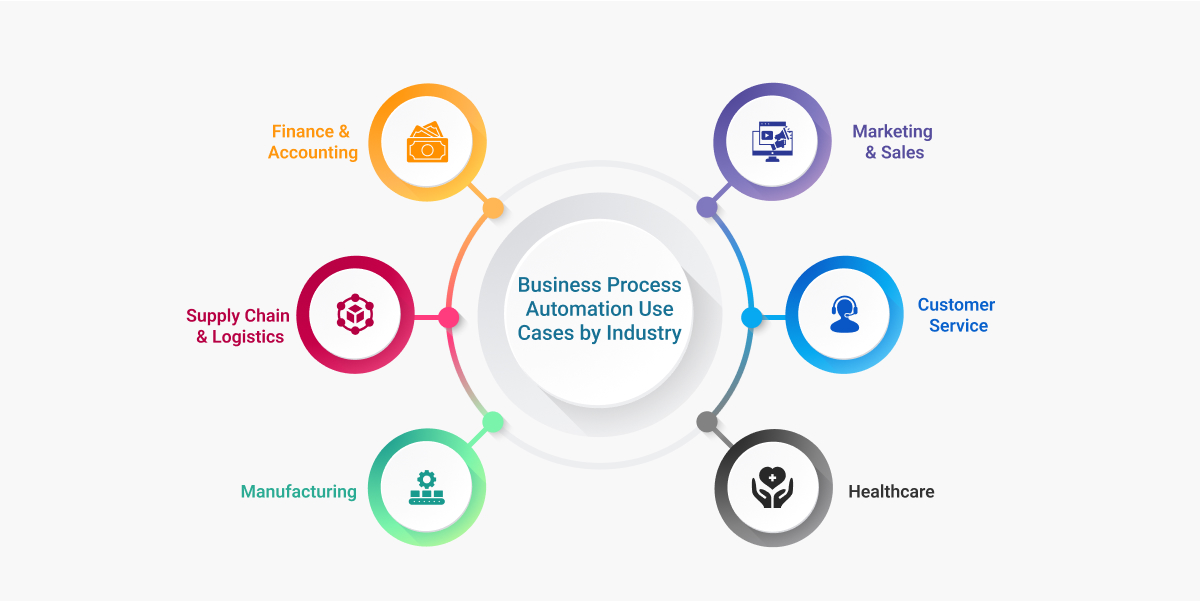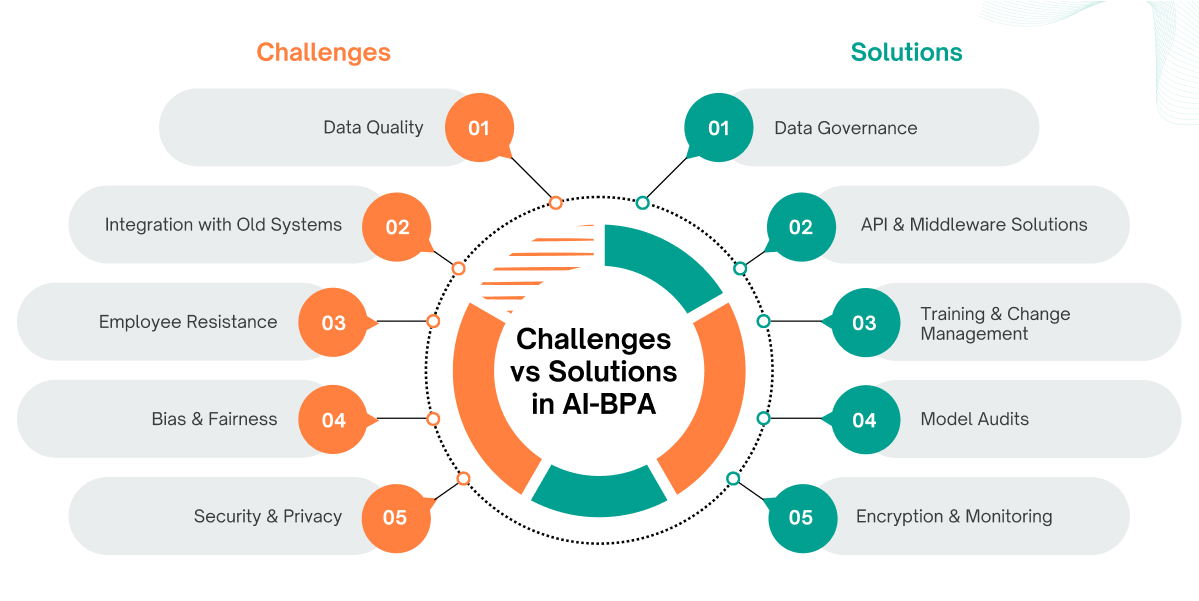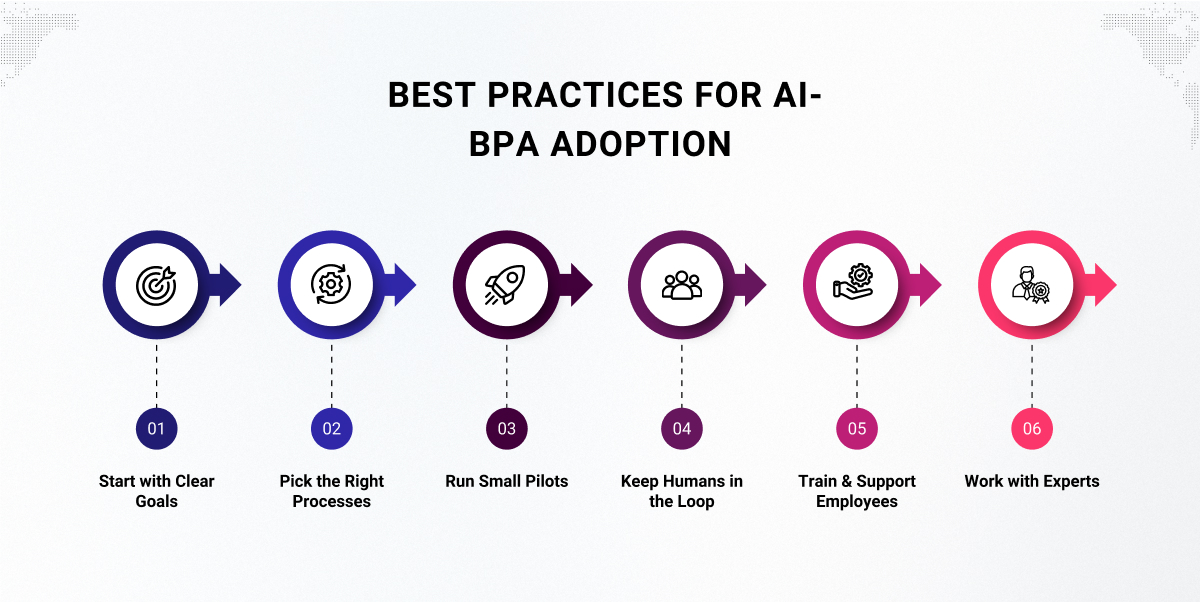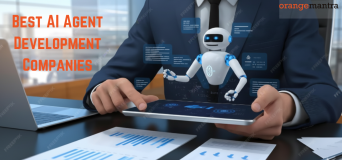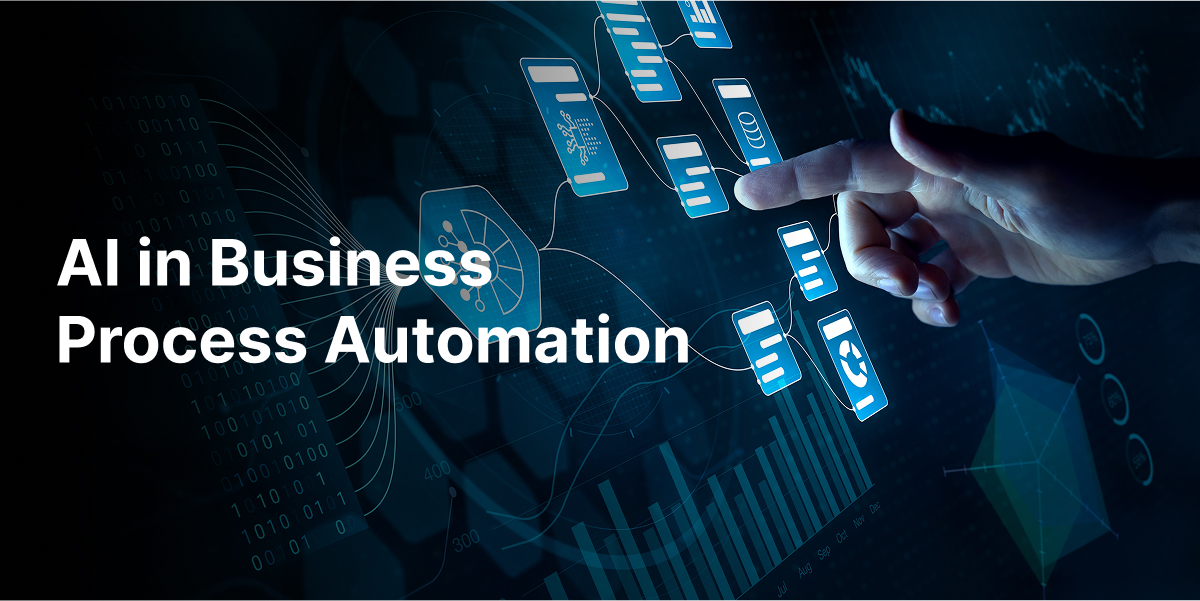
In this blog, you’ll discover how AI is transforming business process automation (BPA). We’ll cover what AI-BPA really means, the key benefits it brings, real-world use cases across industries, and the challenges businesses face when adopting it. You’ll also learn best practices for implementation, future trends shaping AI automation, and how Orangemantra helps companies turn routine work into smart work.
At Orangemantra, we have seen many businesses struggle with slow, manual processes. From our client work, we know automation is not just about saving time but also about unlocking growth.
A recent study by McKinsey shows that almost 60% of jobs can save time with AI business automation. This means companies can cut costs, improve speed, and let workers focus on creative tasks instead of paperwork.
This is where Artificial Intelligence (AI) comes in. AI is more than just a buzzword. It helps businesses run faster, smarter, and with fewer errors. From customer support chatbots to automatic invoice checks, AI development services is changing how work gets done.
This blog post will explore how AI is used in business process automation, the key benefits it brings, and real-world use cases across industries. By the end, you’ll see how companies can turn routine work into smart work with AI business automation.
Table of Contents
What is AI in Business Process Automation?
Business Process Automation (BPA) means using technology to handle routine tasks. For example, sending automatic emails, processing invoices, or updating records. It helps companies save time and reduce human error.
But traditional automation only follows fixed rules. If something changes, it often fails. That’s where AI makes a big difference.
AI-powered automation is smarter. It does not just follow rules. It learns from data, spots patterns, and makes better decisions over time.
In our projects, we have seen RPA handle tasks like invoice scanning with near 100% accuracy, while LLMs power smarter chatbots for customer service.
Some common ways AI is used in automation are:
- Robotic Process Automation (RPA): Handles repeated digital tasks like copy-paste, form filling, or report generation. With AI added, RPA development services can manage more complex work.
- Machine Learning (ML): Helps systems learn from past data and improve results.
- Natural Language Processing (NLP): Allows machines to understand and respond to human language, like chatbots.
- Computer Vision: Lets machines “see” and analyze images or documents.
- Predictive Models: Forecasts trends like customer demand or stock needs.
- Generative AI & Large Language Models (LLMs): Create text, summaries, or even code. They improve communication, reporting, and decision support.
Together, these tools make automation flexible and intelligent. Instead of only following commands, AI business automation systems can adapt, solve problems, and work faster.
In short, AI turns basic automation into “smart automation.” It makes businesses more efficient and ready for change.
Benefits of AI in Business Process Automation
Using AI business automation brings many advantages for businesses. It not only saves money but also makes daily work easier and smarter. Let’s look at the main benefits.
1. Higher Productivity
AI takes care of time-consuming tasks like data entry, scheduling, and report making. This frees employees to focus on bigger goals. Work gets done faster, with fewer delays.
2. Cost Savings
When routine tasks are automated, companies need fewer resources to complete them. This reduces costs in departments like finance, HR, and supply chain.
3. Better Accuracy
Manual work often leads to mistakes. AI reduces errors by checking documents, validating data, and spotting issues early. This lowers risk and improves reliability.
4. Faster Decisions
AI business automation can analyze large amounts of data within seconds. This helps managers take quick and informed decisions, without waiting for long reports.
5. Improved Customer Service
AI chatbots development can answer questions 24/7. Customers get instant support without waiting in line. Personalized recommendations also make the customer feel valued.
6. Stronger Compliance and Security
Many industries must follow strict rules. AI tools can monitor processes, track records, and ensure businesses meet legal standards. This reduces the risk of penalties.
7. Improved Employee Experience
By removing boring, repeated work, AI helps employees focus on creative and meaningful tasks. This increases job satisfaction and reduces stress.
These benefits of intelligent process automation make work faster, cheaper, and more accurate. It helps both businesses and employees win together.
For example, one of our retail clients reduced order processing time by 40% after automation. This not only saved costs but also improved customer satisfaction.
Real-World Use Cases of AI in Business Process Automation
AI business automation is already helping businesses in many industries. Here are some real-world business process automation use cases of how companies use AI business process automation.
1. Finance and Accounting
AI makes finance processes faster and safer. It can scan and process invoices automatically, which saves hours of manual work. Banks also use AI to detect fraud by spotting unusual spending patterns. Loan approvals and credit checks are also quicker with AI tools.
2. Supply Chain and Logistics
In logistics, AI helps companies plan better. It forecasts product demand so businesses don’t overstock or run out of items. AI also chooses the best delivery routes, which cuts fuel costs and saves time. Companies like Amazon use AI to manage warehouses more efficiently.
We also helped a client improve delivery routes using predictive analytics.
3.Manufacturing
AI business automation keeps factories running smoothly. It predicts when machines need maintenance before they break down. This reduces downtime and saves money. AI also checks product quality using computer vision, making sure defects are caught early. Companies like Siemens use these systems in smart factories.
4. Marketing and Sales
AI integration services helps businesses understand customers better. It groups buyers based on their interests and behaviour. This allows companies to create personalized marketing campaigns that improve sales. For example, Coca-Cola uses AI to design ads that connect with customers more directly.
5. Customer Service
AI improves customer support with chatbots that answer questions 24/7. It also sorts tickets and sends them to the right team, which speeds up response time. Platforms like Salesforce use AI to track customer history and provide better service.
6. Healthcare
In healthcare, we used AI business process automation to reduce paperwork for hospitals by automating patient record management and claims processing. It also speeds up test analysis and appointment scheduling. This helps doctors and staff focus more on patient care.
These examples show that AI-powered automation is not limited to one field. It is helping businesses everywhere become faster, more reliable, and more customer-friendly.
Challenges in Implementing AI-BPA
AI-powered automation has many benefits, but it also comes with challenges. Businesses need to plan carefully and understand the impact of business process automation before adopting it.
We often see businesses struggle with data silos. In our consulting, we solve this by creating unified data pipelines before automation starts.
1. Data Quality Issues
AI works best when it has clean and accurate data. If the data is incomplete, old, or inconsistent, the results will not be reliable. Many companies struggle to maintain good data practices.
2. Integration with Old Systems
Many businesses still run on legacy systems. Adding AI business automation to these old platforms can be difficult and costly. Without proper integration, the automation may fail.
3. Employee Resistance
Some employees fear that AI will replace their jobs. This creates resistance to change. Companies must show workers how AI can support them, not replace them.
4. Bias and Fairness
AI makes decisions based on the data it learns from. If the data has bias, the system may give unfair results. Businesses must monitor AI models to avoid these risks.
5. Security and Privacy
AI systems handle a lot of sensitive information. This makes them a target for hackers. Companies need strong security and privacy measures to protect customer and business data.
These challenges do not mean companies should avoid AI. Instead, they highlight the need for careful planning, strong data practices, and clear communication.
Best Practices for AI-BPA Adoption
Using AI business automation is not just about installing tools. Businesses must follow the right steps to make it work well.
We advise clients to begin with small pilot projects. For example, we automated invoice approvals for a mid-size company before expanding into HR tasks. Here are some best practices.
1. Start with Clear Goals
Companies should know what they want to achieve before starting. It could be saving time, cutting costs, or improving customer service. Clear goals make it easier to measure success.
2. Pick the Right Processes First
Not every task is fit for automation. Businesses should begin with simple, high-volume tasks that take up a lot of time. Once those succeed, they can move to more complex tasks.
3. Run Small Pilot Projects
It is better to test automation on a small scale first. This helps spot problems early and reduces risks. After success, companies can expand to more areas.
4. Keep Humans in the Loop
AI business automation should support people, not replace them fully. A human review step ensures better accuracy and trust in the system.
5. Train and Support Employees
Workers need to understand how the new system helps them. Training removes fear and builds confidence. When employees feel supported, adoption becomes smoother.
6. Work with Experts
Not all businesses have the right skills in-house. Partnering with experienced tech experts makes adoption faster and safer. This also reduces mistakes during setup.
By following these best practices, businesses can make the most of AI-powered automation. It ensures a smooth transition and lasting benefits.
Future Trends in AI-Powered Business Process Automation
AI for business automation solutions is still growing. In the coming years, it will become even more powerful. Here are some trends to watch.
1. Hyperautomation
Businesses will start combining many tools together. This will make processes faster and smarter. It will also reduce the need for manual work.
2. Smarter Virtual Assistants
Chatbots and digital helpers will get better. They will handle more complex questions and give more human-like answers.
3. Real-Time Decision Making
AI business automation systems will work faster with real-time data. This will help companies act quickly in areas like stock management, shipping, and customer service.
4. Generative Tools
New tools will create content like reports, product descriptions, or even training material. This will save employees hours of manual effort.
We are already helping clients test generative AI developments tools for report writing, and we see this becoming mainstream in the next few years.
5. More Use in Small Businesses
AI will not just be for big companies. As costs go down, small businesses will also use automation to improve efficiency.
These trends show that AI in automation is only at the beginning. In the future, it will become an everyday part of business life.
Orangemantra’s Expertise in AI-Powered Business Process Automation
At Orangemantra, we understand that every business has unique needs. That’s why we don’t believe in one-size-fits-all solutions. Instead, we create automation systems that fit your specific goals. Our approach includes:
1. Process Consulting
We study your workflows and suggest the best areas to start automation.
2. Custom AI Solutions
We design tools tailored to your business, whether it’s for finance, supply chain, or customer service.
3. Seamless Integration
Our solutions work smoothly with your current systems, such as ERP, CRM, or legacy platforms.
4. Ongoing Support
We provide regular updates, audits, and improvements to keep automation reliable and secure.
5. Cross-Industry Expertise
From healthcare to retail, we have delivered automation projects that drive real results.
By combining our technical expertise with deep industry knowledge, Orangemantra helps businesses cut costs, save time, and improve customer satisfaction through AI-powered automation.
Conclusion
Every business wants to save time, cut costs, and serve customers better. But old ways of working slow things down. AI business automation gives companies a smart way forward.
It takes care of repeated tasks, reduces errors, and makes work faster. From finance to healthcare, almost every industry is seeing the benefits.
Of course, there are challenges like data quality, security, and employee fears. But with the right planning and support, these can be managed.
AI in business process automation is not just a trend. It is becoming a key part of how companies work and grow. Businesses that adopt it early will have an edge in speed, efficiency, and customer satisfaction.
At Orangemantra, we have seen how the right automation strategy can transform business operations. By combining our technical expertise with industry experience, we help companies move from slow, manual processes to faster, smarter workflows.
The future belongs to those who turn routine work into smart work.
FAQs on AI in Business Process Automation
Q1. What is AI in business process automation?
It means using smart tools to handle daily tasks like data entry, emails, or customer support. These tools can learn and improve over time, making work faster and easier.
Q2. Is an audit of business process automation software needed?
Yes. Regular audits are important. They check if the system is working as planned, safe, and following company rules. Audits also help find errors early and keep the process reliable.
Q3. How is AI different from normal automation?
Normal automation follows fixed rules. If something changes, it often stops working. AI is smarter. It can adapt, learn from data, and make better decisions.
Q4. What are the benefits of using AI in automation?
It saves time, cuts costs, reduces mistakes, and helps employees focus on important work. It also improves customer service with faster responses.
Q5. Will AI replace human workers?
AI is not here to fully replace people. It handles boring, repeated tasks so employees can focus on creative and meaningful work. It is more of a support system than a replacement.
6. Is it expensive to use AI for automation?
At first, it may cost money to set up. But over time, it saves a lot more by reducing errors and speeding up work.
7. What is the future of AI business automation?
AI will become more advanced and common. It will help both big and small businesses. Smarter assistants, faster decisions, and better customer support are expected in the future.
